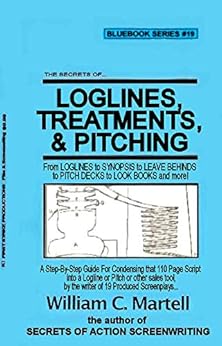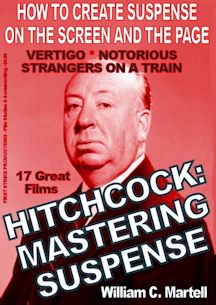The adventures of a professional screenwriter and sometimes film festival jurist, slogging through the trenches of Hollywood, writing movies that you have never heard of, and getting no respect.
Voted #10 - Best Blogs For Screenwriters - Bachelor's Degree
Wednesday, September 09, 2020
Death By.... Encoragement!
Many pre-pro writers send out their scripts to agents or managers or producers and (usually as a result of hammering away for a response) get a nice rejection note saying that their masterpiece is “Well written, but not right for us”, or they “Loved it, but we have something similar in development”, or some other exciting and positive thing about how much they loved your screenplay. They celebrate how close they came to selling their script and brag to all of their friends that they are almost over that big wall that surrounds Hollywood. Everyone loved their script! They are great writers!
When I was living in my home town dreaming of Hollywood I had a chance to give a copy of one of my scripts to my idol at the time, Paul Schrader. He wrote TAXI DRIVER and OBSESSION and CLOSE ENCOUNTERS and THE YAKUZA and ROLLING THUNDER and OLD BOYFRIENDS and other films I loved... and he took a copy of my script and read it (or had someone read it) and sent me a great letter of encouragement. I sent the same script to my favorite director, Martin Scorsese, and he had someone read it, and they sent me this great letter of encouragement on Columbia Pictures stationery! My script was the greatest script on the world!
Of course, when I read that script today I cringe at how awful it is and am embarrassed that people I admired had to read it - or get their assistants to read it. That script just sucked.
Pauline Kael once said, “Hollywood’s the only town where you can die of encouragement.”
No one will ever tell you that your script sucks. The reason why is simple - they read your current script, which sucks, but what if you keep working hard at this screenwriting thing and improve and a few years later you write a great script. One of those scripts that everyone in Hollywood is fighting with each other over. There are bidding wars - and the winner not only gets to pay you a huge amount of money, they get that amazing script you have written. But if Joe’s Productions tells you that your earlier script sucks, they won’t be part of that bidding war. You will not take your script there. What Joe’s Productions wants is for you to be the *first* place you go with that great new script - so that they can maybe buy it before there is a bidding war... or at least be the friendly producer that you want to sell the script to. So, instead of saying “Your script sucks” they come up with a euphemism like “Loved it, but we have something similar in development.”
That really means your script sucks.
Here’s how to tell if they *really* loved it:
1) They buy it or option it (for real money).
2) They want to meet with you to discuss other projects.
3) They offer you a writing assignment.
4) They *request* your next script or ask to read other scripts you have written.
I have a script tip on this floating around on my website, but you should even beware of producers who want to option your script for $1 or no money. Basically, you get what they pay for. If they have a dollar invested, that is what your script is worth to them, and tells you how hard they will work to bring it to the screen. In that tip, I talk about a producer I know of who literally options every script he can get his hands on for $1 and never reads any of them. He is a “material pack rat” and his theory is that if he options 100 scripts for $1 (sight unseen) one of them has to either be good enough to set up somewhere or has some strange elements that some real producer may be looking for. This guy has you write down “keywords” about your script, then takes your script to a warehouse where it will be forgotten like the Lost Ark, and if any real producer is looking for a script with the keywords for your script - this guy tries to set up a deal. If you’ve read any of those strange script requirements in InkTip listings, you know how oddly specific some producer’s needs are. And this guy has a warehouse full of scripts he *owns*, and one may fit those strange needs. If not, he’s only out $1. The thing about options - if they pay you $1, that’s what they think your script is worth, and most likely it’s not a real option. Sure, sometimes there are underfunded legit producers looking to have control over a script when they take it into a studio... but usually the $1 option isn’t much different than no option at all. And how much can you celebrate when all you have is $1?
If they read your script and did have something just like it in development, but thought the writing was great, they will ask to read something else or want to meet with you. If they actively pursue you, you have something they want (writing). If they say nice things but don’t *do anything*, they don’t think the writing is strong enough to follow up on.
Just like in a screenplay, in real life - actions speak louder than words.
Producers will tell you all kinds of nice things, but what they *do* tells you want they really think. If they do nothing, well...
Now, that doesn’t necessarily mean your script *completely sucks*, but it’s just not there yet. Keep working at it, and eventually they *will* do something. They won’t just say, “We loved it but it’s not for us”, they will want to meet with you to discuss anything you may have that *may be* for them. Because producers need screenplays and they need screenwriters. Can’t make a movie without a script.
No matter how many great things they say about your script, look at what they *do* - that will tell you what they really think. And if they don’t do anything, all is not lost! You just need to keep writing until you get that script where they actually do something... not just tell you how much they loved it.
- Bill
Wednesday, August 19, 2020
Magic Time
So, the assignment was turned in last week, and they’ve read it and like it. There’s always a certain amount of writer’s paranoia that has me worried they will drive over to my place, light the script on fire and leave it on my porch, hit the doorbell, then drive away. *I* like the script, but you never know if anyone else will. You hope they will.
Because I have a deadline, and must be able to plan out my writing so that I have a finished screenplay on time, I use an outline. I usually outline, but I’ve done a couple of experiments working without an outline... which usually serves to remind me why I need an outline. Some people think that an outline handcuffs you, but I think it frees me. I know where the story is going, I know what has to happen... but I don’t know exactly how it happens. And sometimes that means there’s some sort of magic that happens while you’re writing a scene, and the scene is exciting and entertaining to write.
Here’s an example: The script is a fun monster movie, similar to TREMORS. There’s a sequence I called the Tides Restaurant Scene (from THE BIRDS) where the monster chases a bunch of folks into a building, where they discuss where the monster came from and how the heck they’re gonna deal with it... while the monster tries to break in to eat them. Sort of a town meeting during an attack. That’s basically what I had in my outline - I knew key story points and all of the things that I was setting up for later... but I didn’t know the *how it happened*.
While writing the scene, I came up with all kinds of funny bits that entertained me as I wrote the sequence, and then I came to the halfway point, where the monster would break in and eat some people, which forces our folks to stop talking about where this monster may have come from and figure out how they’re gonna kill it. When the people run into the building to take cover from the monster, they reinforce the doors and windows, making them “monster proof”. But the monster breaks in, destroys the reinforcements, grabs a couple of people and goes outside to chow down. Our hero realizes they have nothing to reinforce the doors with - they will have to hold them closed themselves. He asks for volunteers, and one guy says he’s crazy, the monster is right out there, it’s going to break in again, and he doesn’t want to be anywhere near the doors when that happens. They hero makes the big speech (fun to write) and then...
Well, magic happened.
One of the townspeople got up, walked to the doors, and used their body to hold them closed... then another person got up, and another, and another, and another... until *everyone* was against the doors, holding them closed as a group, except the naysayer. Who didn’t want to be left out, so he joins all of the others.
Okay, this was a scene where they find something else to reinforce the doors to keep the monster out in the outline... and that’s what happens. But in the outline I was thinking it would probably be tables and chairs, right? Which is how outlines work - you just figure out the skeleton of the story and fill in the details when you write it. They barricade the doors. Once you get to the writing stage, you get creative. Hey, maybe they barricade the doors with a car or something, right? You try to come up with something that you haven't seen before in a movie. Knowing that you need to do something different *helps* you. Your subconscious knows this is coming up, and starts to work on the problem... and that leads to the magic happening. The scene idea that isn't off the top of your head, it;s been percolating in your subconscious all of this time. Well, I guess it has - hard to tell about that subconscious.
But I think this is going to be one of those “I am Spartacus” moments. One of those amazing big moments that make the audience emotional. And it just happened by magic - I created it as I was writing the script, because *something* needed to reinforce those doors. Oh, and it’s thematic, because the story is about how all species need each other to survive (the monster was created by fooling with mother nature). Look, this is a silly monster movie... no one is going to give it 4 stars, it won’t make critic’s lists... critics won’t even know it exists. It’s just a silly movie. But I still want it to be emotional, and funny, and scary and something that you watch and don’t thing was a total waste of your time (only a partial waste). So I need scenes like that. And even with an outline, even knowing what happens next and who gets eaten before the final credits, there’s still room for lightning to strike - still room for that magic to happen on the page. I live for scenes like that - the ones that come from nowhere and have me tearing up as I type them. I live for those funny lines that come right off the top of my head. I live for that one thing you invent in the fly that turns a bunch of words into a living, breathing *person*.
That’s the magic. We take a bunch of words, and turn them into emotions.
That’s what I love about writing.
- Bill
TODAY'S SCRIPT TIP: Adaptation
Yesterday’s Dinner: Burrito at Tortas in Studio City.
Monday, August 03, 2020
My Films Come Back To Haunt Me...
TubiTV is kind of the old folks home for movies. When a film has played every cable channel and every broadcast channel (including Spanish language) and been released on DVD and Blu-ray and done it's theatrical run in every country - even the ones that show movies on a bed sheet, and every single cent has been made... They go to TubiTV. It's free streaming with lots of commercials. But R rated films are uncut.
I had 7 movies there last month, only 6 this month. You missed IMPLICATED from MGM home video. Here are the 6...
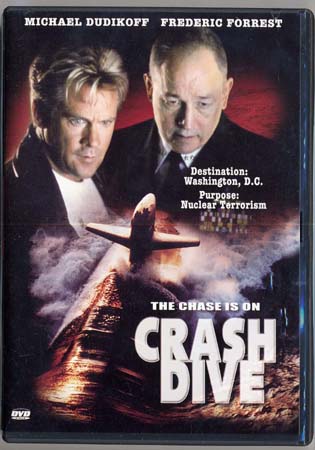 CRASH DIVE, made for HBO as a "World Premiere". Played theatrical overseas and was Top 10 box office in some countries. Catherine Bell's first lead role and the reason why she was cast in JAG. We originally had Scott Glenn signed and he ditched us to make a Clint Eastwood movie. Our last minute replacement from the HBO approved list was American Ninja (the theatrical films from Cannon Pictures, not the TV show) Michael Dudikoff. Last minute script rewrite turning lead from brainiac to Kung Fu guy. Oh, Chris Titus also got his own TV show after this... though I don't think this film had anything to do with it.
CRASH DIVE, made for HBO as a "World Premiere". Played theatrical overseas and was Top 10 box office in some countries. Catherine Bell's first lead role and the reason why she was cast in JAG. We originally had Scott Glenn signed and he ditched us to make a Clint Eastwood movie. Our last minute replacement from the HBO approved list was American Ninja (the theatrical films from Cannon Pictures, not the TV show) Michael Dudikoff. Last minute script rewrite turning lead from brainiac to Kung Fu guy. Oh, Chris Titus also got his own TV show after this... though I don't think this film had anything to do with it.
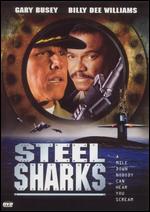 STEEL SHARKS, also HBO, also theatrical overseas. Starring Billy Dee Williams and Gary Busey fresh out of rehab and some guy who was on the HBO approved list and was starring on BAYWATCH. Billy Dee told me that he had 3 scripts to choose from and chose mine... but he may say that to all the screenwriters. Also a US Navy Co-Op movie. Reason why I hate the director - we had 3 days on a real aircraft carrier with Billy Dee... and it all looks like stock footage. This guy made everything look like crap. Our pyro guy did the largest fireball on screen - going for a record - and the director forced the DP to shoot the base of the explosion - you have no idea how big the fireball was.
STEEL SHARKS, also HBO, also theatrical overseas. Starring Billy Dee Williams and Gary Busey fresh out of rehab and some guy who was on the HBO approved list and was starring on BAYWATCH. Billy Dee told me that he had 3 scripts to choose from and chose mine... but he may say that to all the screenwriters. Also a US Navy Co-Op movie. Reason why I hate the director - we had 3 days on a real aircraft carrier with Billy Dee... and it all looks like stock footage. This guy made everything look like crap. Our pyro guy did the largest fireball on screen - going for a record - and the director forced the DP to shoot the base of the explosion - you have no idea how big the fireball was.
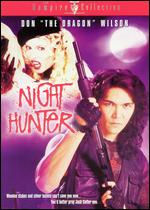 NIGHT HUNTER, was a Cinemax Original Movie, which is what happens when an HBO movie goes wrong. This began as a cool vampire movie, but they cut out all of the horror in (my) rewrites. Star didn't want to make a horror movie. Some of the practical FX stuff we had planned was amazing - a Samurai vampire who gets sliced in half... and keeps fighting! A cool hall of mirrors chase scene (vampires don't reflect). A rooftop chase scene - where the vampires flew! More cool stuff... cut from the script! The director did a great job - very atmospheric. Made 3 years before BLADE. Oh, first shaky-cam film. Sorry.
NIGHT HUNTER, was a Cinemax Original Movie, which is what happens when an HBO movie goes wrong. This began as a cool vampire movie, but they cut out all of the horror in (my) rewrites. Star didn't want to make a horror movie. Some of the practical FX stuff we had planned was amazing - a Samurai vampire who gets sliced in half... and keeps fighting! A cool hall of mirrors chase scene (vampires don't reflect). A rooftop chase scene - where the vampires flew! More cool stuff... cut from the script! The director did a great job - very atmospheric. Made 3 years before BLADE. Oh, first shaky-cam film. Sorry.
 VIRTUAL COMBAT (aka GRID RUNNERS). Also HBO World Premiere and theatrical overseas. We were on the cover of Sci-Fi Entertainment Magazine a year before VIRTUOSITY script was bought. Same star as NIGHT HUNTER, same issues with the special effects scenes... but many of the FX stuff was *built* but never used! On this we had FX stuff made - crawling half formed bodies from the cloning tank... never shot. We were the 2nd film to shoot on LA subway (after that Keanu movie). Act 3 was rewritten overnight when we lost our original location.
VIRTUAL COMBAT (aka GRID RUNNERS). Also HBO World Premiere and theatrical overseas. We were on the cover of Sci-Fi Entertainment Magazine a year before VIRTUOSITY script was bought. Same star as NIGHT HUNTER, same issues with the special effects scenes... but many of the FX stuff was *built* but never used! On this we had FX stuff made - crawling half formed bodies from the cloning tank... never shot. We were the 2nd film to shoot on LA subway (after that Keanu movie). Act 3 was rewritten overnight when we lost our original location.
 CYBERZONE (aka DROID GUNNER) - my Roger Corman robot hookers from outer space flick. Began as a female lead BLADE RUNNER ripoff about the underground railroad for androids... But Roger's Production guys asked if I could do a page one and make it about robot hookers from outer space. Sure. They had a deal with Showtime and just had a film rejected - could I write this in 9 days so the film would be finished in time to plug that hole in Showtime's schedule? Sure. Film was written to be shot in 9 days (a week plus a weekend of 35mm equipment rental). I actually like this movie despite all of its problems. I wrote it for the guys I used to work with in the warehouse. Oh, special effects by some guy named James Cameron.
CYBERZONE (aka DROID GUNNER) - my Roger Corman robot hookers from outer space flick. Began as a female lead BLADE RUNNER ripoff about the underground railroad for androids... But Roger's Production guys asked if I could do a page one and make it about robot hookers from outer space. Sure. They had a deal with Showtime and just had a film rejected - could I write this in 9 days so the film would be finished in time to plug that hole in Showtime's schedule? Sure. Film was written to be shot in 9 days (a week plus a weekend of 35mm equipment rental). I actually like this movie despite all of its problems. I wrote it for the guys I used to work with in the warehouse. Oh, special effects by some guy named James Cameron.
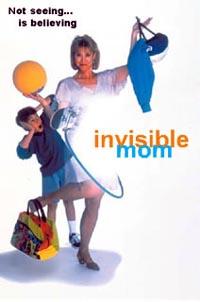 INVISIBLE MOM - direct to video. Dee Wallace from ET played the mom. Barry Livingston, Ernie from MY THREE SONS played the dad. Rusty Tamblin from TWIN PEAKS and WEST SIDE STORY played the boss. Written as a favor - the producer, 80s heart throb Andrew Stevens had started a new company and one of his deals was with Corman's new family film video label. We called them "babysitters" - mom plugs in the video and the kids are busy for 90 minutes. Spawned 4 sequels that I didn't write. I pitched a great idea, they wanted to go in a blander direction. My nieces liked this one more than I did.
INVISIBLE MOM - direct to video. Dee Wallace from ET played the mom. Barry Livingston, Ernie from MY THREE SONS played the dad. Rusty Tamblin from TWIN PEAKS and WEST SIDE STORY played the boss. Written as a favor - the producer, 80s heart throb Andrew Stevens had started a new company and one of his deals was with Corman's new family film video label. We called them "babysitters" - mom plugs in the video and the kids are busy for 90 minutes. Spawned 4 sequels that I didn't write. I pitched a great idea, they wanted to go in a blander direction. My nieces liked this one more than I did.
My two favorites are not here, but those 6 are free on TubiTV - use their search box to find them. I apologize in advance.
- Bill
Wednesday, July 01, 2020
Darth Vader & Storm Troopers On The NYC Subway
Okay, you're taking the subway to work in NYC when suddenly...
- Bill
THE NEW BLUE BOOK!
THE LOGLINES, TREATMENTS, & PITCHING Blue Book!
DISTILLING YOUR SCREENPLAY
Loglines, Treatments, Pitching, Look Books, Pitch Decks, One Pagers, Rip-O-Matics, oh my!
You have written a brilliant 110 page screenplay, but how do you get anyone to read it? You need to distill it down into some form of verbal moonshine or story rocket fuel that will ignite that bored development executive or manager or agent and get them to request your screenplay. But how do you shrink those 110 pages into a 25 word logline or a 2 minute elevator pitch or a one page synopsis or a short paragraph?
How do you take that brilliant visual told story and great characters and snappy dialogue and dramatic moments and spectacular conflict and distill it into 25 words? How is that even possible? And keep it so interesting that that bored development executive reads it and wants to buy your screenplay and turn it into a movie that will make people laugh and cry and kiss $12 goodbye? The most common way is by crafting an amazing logline – rocket fuel – that will make people in the industry want to read your screenplay. The first thing that anyone asks about your screenplay is “What's it about?” and a logline is the answer. They have been used in the film business for almost 100 years, and are the secret to breaking in.
In this just under 100,000 word book we will look at all forms of “distilled story” that you are likely to encounter as a screenwriter, and take you step-by-step through the creation. We will look at the most effective ways to pitch your screenplay, and how the pitch reveals problems with your screenplay. Just about every question that you might have is answered in this book! Including how to use Look Books as a creative tool as well as a sales tool, and why some commercial pitch platforms may be a waste of money. We look at the 4 types of pitches, how a one page synopsis is a “birth to death” element of your screenplay – you may use one to sell the screenplay, and the distributor may use that same one pager on the back of the Blu-ray box! The critical elements needed in any logline. And much more!
So, what's your logline?
THE LOGLINES, TREATMENTS, & PITCHING Blue Book! - Only $4.99!
NO KINDLE REQUIRED! Get the *free* app (any device, except your Mr. Coffee) on the order page on Amazon!
UK Folks Click Here.
German Folks Click Here.
French Folks Click Here.
Espania Folks Click Here.
Canadian Folks Click Here.
India Folks Click Here.
Austrailian Folks Click Here.
Wednesday, June 24, 2020
Just Another Day At Work...
My friends Scott and Ronson found this on YouTube and have posted this on FaceBook, and I'm swiping it from them and posting it here...
Ever wonder what Customer Service is doing at the call center when you are on hold?
- Bill
Wednesday, June 10, 2020
Jane Austen's FIGHT CLUB
I love the shot where the blood sprays from the gal's mouth in slow-mo.
- Bill
Wednesday, June 03, 2020
Bank Fears Cool Confidence
"Bank Fears Cool Confidence"
I saw that headline in the business section of the paper and it confused me. Why would anyone fear cool confidence? I mean, Steve McQueen is all about his cool confidence. That’s why he was a star - he had that strength that didn’t require any machismo. McQueen could just stroll into a room, and without saying a word, you knew he was in control... and you were in trouble. And maybe that’s what the banks fear? I mean, McQueen starred in a couple of movies where he played a bank robber...

But if you are going to fear anything, wouldn’t it be the gun or the threat of violence? Why would you fear the cool confidence? Of all the possible things to fear in a bank robber, his attitude seems like it would be close to the bottom of the list of fears. Why didn’t the headline read, “Bank Fears Psychos With Guns”?
You know, Hollywood isn’t really the town for cool confidence. An actor that can project that attitude is great, but this is pretty much a town of braggarts and bullshit. If you take two screenwriters, one who has that cool confidence because they *know* they are talented and *know* they’ve had some success, and the other one is some loud hyper dude telling every one what an amazing writer they are... the odds are the loud hyper dude is believed as successful and the cool guy isn’t even noticed. Producers and studio execs are more likely to believe the hype than look for the reality. Maybe it’s a take one to be fooled by one thing, I don’t know. I do know a few writers who have PR people... and everyone seems to believe the PR... even though their scripts suck. In fact, that’s funny - they usually still believe the PR after they’ve seen the reality.
This town was built on bullshit. Bullshit is *expected*. I think everyone automatically reduces everything you say by 75%, to account for the bullshit factor... and that’s a problem for those of us with cool confidence. We don’t say much, we don’t brag, and if we do mention our accomplishments, we tend to downplay them. So after they deduct the 75% they think is bullshit, we may be left with nothing.
Clint Eastwood has that cool confidence, too - and he’s played bank robbers before...
So, maybe the banks know something that Hollywood doesn’t. Maybe the banks know that the guy who brags isn’t as dangerous as the guy with cool confidence? Maybe that’s something Hollywood *needs* to learn? I mean, they give some dude $100 million to make a movie because he *says* he’s talented, but maybe they’d be better served by skipping the bullshit and looking at what the guy does - is he really talented? Or is it all PR?
So, after thinking about cool confidence, and wondering why banks fear it so much, I re-read the headline and figured out they meant to accent different syllables. It’s not that Banks Fear Cool Confidence, it’s that confidence has been cooled due to fears about banks. To quote Emily Litella: "Oh... Well, never mind."
- Bill
Wednesday, May 27, 2020
Tales From The Script
If you believe that after you win the Oscar for Best Original Screenplay you will suddenly be treated better by Hollywood and your writing will be respected and not messed with by the damned dirty apes of development... think again! You’ll have to deal with all of the same problems - you’ll just get paid more.
Two weeks ago I went to the Aero Cinema in Santa Monica to see the pre-DVD release screening of...

TALES FROM THE SCRIPT is a great documentary that all screenwriters both new and abused should see. Filmmakers Peter Hanson and Paul Robert Herman interviewed dozens of professional screenwriters about their work, the business, and how the role of the screenwriter has changed over the years. The film is broken down into chapters, with many screenwriters addressing the same issue in each chapter. Shane Black, Frank Darabont, William Goldman, David Hayter, Paul Schrader, Ron Shelton, David S. Ward, and just about any writer you can name is interviewed. You learn the truth about screenwriting - a truth you may not have wanted to know, but that will help you navigate the treacherous waters of the screenwriting business. Though the film is simple talking head interviews - these folks are all great storytellers, and when they tell a war story about the business it’s a heck of a good story! I was never bored - and usually too busy laughing or squirming with terror.
If you have seen the film on screen, the DVD has 3 big special features:
47 minutes of additional interviews.
12 minutes of William Goldman’s advice.
9 minutes of advice for new screenwriters from the pros.

There is also a companion book with *different interviews* and *different screenwriters*.
The DVD is available on Amazon and on Netflix - check it out.
After the screening there was a great panel of screenwriters doing Q&A, many of them I know. It was kind of cool. Steve DeSouza, Peter Hyams,. Stephen Susco, Bruce Joel Rubin, Adam Rifkin, and a couple of others. It was a great Q&A session - many things that probably will never see print or film or tape - because these guys want to continue to work in this town. Bruce told a horror story about a big name star who has no story sense at all - but is so big that whatever he wants in the script goes in the script... even if the resulting film sucks. The film is filled with stories like this!
POPATOPOLIS!
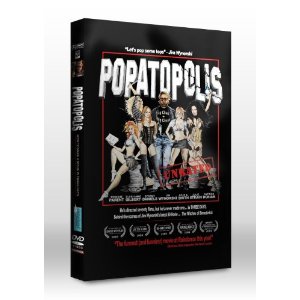
And Thursday May 27th at 7:30pm at the Egyptian Theater in Hollywood, the Los Angeles Premiere of POPATOPOLIS - a film I saw at the Raindance International Film Festival in London last year. The movie is being released on DVD, and this screening is a celebration...
POPATOPOLIS is a film that answers the question - can you make a feature film in 3 days with a crew of only 2, starring women with freakishly large breasts who may be too top heavy to stand? B movie director Jim Wynorski can... and this doc chronicles every crazy minute.
Here is a link to my review from London - POPATOPOLIS.
If you are in Los Angeles and like sleazy low-end Z movies, come on down and see this documentary on how they are made!
- Bill
Wednesday, May 06, 2020
John Sayles on Matewan
Sayles is one of my favorite writers. I discovered him through PIRANHA and THE HOWLING and many other fine films that seem to be horror movies but are actually much more. I tracked down his short stories and first novel, PRIDE OF THE BIMBOS, and loved BIMBOS so much that I bought up a bunch of paperback copies decades ago and gave them to friends. The novel is about a boy with divorced parents who lives with his father for one summer and learns what it means to be a man - typical coming of age story... except the kid's father plays on an exhibition baseball team kind of like the Harlem Globetrotters (which is basketball, I know) who play in drag. So, this boy learns about being a man by hanging around men dressed as women.
Since then I've bought all of Sayles novels and short story collections and seen all of his movies. One of the things I like about him is that he comes from blue collar roots and his films and stories are full of working people. That ends up making him kind of a Leftie, because he's all for worker's rights and unions... which is what MATEWAN was all about.
- Bill
Monday, April 27, 2020
New: LOGLINES, TREATMENTS, & PITCHING
NEW!
THE LOGLINES, TREATMENTS, & PITCHING Blue Book!
DISTILLING YOUR SCREENPLAY
Loglines, Treatments, Pitching, Look Books, Pitch Decks, One Pagers, Rip-O-Matics, oh my!
You have written a brilliant 110 page screenplay, but how do you get anyone to read it? You need to distill it down into some form of verbal moonshine or story rocket fuel that will ignite that bored development executive or manager or agent and get them to request your screenplay. But how do you shrink those 110 pages into a 25 word logline or a 2 minute elevator pitch or a one page synopsis or a short paragraph?
How do you take that brilliant visual told story and great characters and snappy dialogue and dramatic moments and spectacular conflict and distill it into 25 words? How is that even possible? And keep it so interesting that that bored development executive reads it and wants to buy your screenplay and turn it into a movie that will make people laugh and cry and kiss $12 goodbye? The most common way is by crafting an amazing logline – rocket fuel – that will make people in the industry want to read your screenplay. The first thing that anyone asks about your screenplay is “What's it about?” and a logline is the answer. They have been used in the film business for almost 100 years, and are the secret to breaking in.
In this just under 100,000 word book we will look at all forms of “distilled story” that you are likely to encounter as a screenwriter, and take you step-by-step through the creation. We will look at the most effective ways to pitch your screenplay, and how the pitch reveals problems with your screenplay. Just about every question that you might have is answered in this book! Including how to use Look Books as a creative tool as well as a sales tool, and why some commercial pitch platforms may be a waste of money. We look at the 4 types of pitches, how a one page synopsis is a “birth to death” element of your screenplay – you may use one to sell the screenplay, and the distributor may use that same one pager on the back of the Blu-ray box! The critical elements needed in any logline. And much more!
So, what's your logline?
THE LOGLINES, TREATMENTS, & PITCHING Blue Book! - Only $4.99!
NO KINDLE REQUIRED! Get the *free* app (any device, except your Mr. Coffee) on the order page on Amazon!
UK Folks Click Here.
German Folks Click Here.
French Folks Click Here.
Espania Folks Click Here.
Canadian Folks Click Here.
India Folks Click Here.
Austrailian Folks Click Here.
Friday, March 27, 2020
Hitchcock Talks Terror
And Fairy Tales?
- Bill
Of course, I have my own books focusing on Hitchcock...
HITCHCOCK: MASTERING SUSPENSE
LEARN SUSPENSE FROM THE MASTER!Alfred Hitchcock, who directed 52 movies, was known as the “Master Of Suspense”; but what exactly is suspense and how can *we* master it? How does suspense work? How can *we* create “Hitchcockian” suspense scenes in our screenplays, novels, stories and films?
This book uses seventeen of Hitchcock’s films to show the difference between suspense and surprise, how to use “focus objects” to create suspense, the 20 iconic suspense scenes and situations, how plot twists work, using secrets for suspense, how to use Dread (the cousin of suspense) in horror stories, and dozens of other amazing storytelling lessons. From classics like “Strangers On A Train” and “The Birds” and “Vertigo” and “To Catch A Thief” to older films from the British period like “The 39 Steps” and “The Man Who Knew Too Much” to his hits from the silent era like “The Lodger” (about Jack The Ripper), we’ll look at all of the techniques to create suspense!
Films Included: NOTORIOUS, SABOTAGE, STRANGERS ON A TRAIN, THE 39 STEPS, REBECCA, TO CATCH A THIEF, FRENZY, FOREIGN CORRESPONDENT, THE LODGER, THE BIRDS, TORN CURTAIN, SABOTEUR, VERTIGO, THE MAN WHO KNEW TOO MUCH (1934), THE MAN WHO KNEW TOO MUCH (1955), SUSPICION, and NUMBER SEVENTEEN. 17 Great Films!
Only 125,000 words!
Price: $5.99
Click here for more info!
OTHER COUNTRIES:
UK Folks Click Here.
German Folks Click Here.
French Folks Click Here.
Espania Folks Click Here.
Canadian Folks Click Here.
And....
HITCHCOCK: EXPERIMENTS IN TERROR

USA Readers click here for more info!
HITCHCOCK DID IT FIRST!
We all know that Alfred Hitchcock was the Master Of Suspense, but did you know he was the most *experimental* filmmaker in history?
Contained Thrillers like “Buried”? Serial Protagonists like “Place Beyond The Pines”? Multiple Connecting Stories like “Pulp Fiction”? Same Story Multiple Times like “Run, Lola, Run”? This book focuses on 18 of Hitchcock’s 52 films with wild cinema and story experiments which paved the way for modern films. Almost one hundred different experiments that you may think are recent cinema or story inventions... but some date back to Hitchcock’s *silent* films! We’ll examine these experiments and how they work. Great for film makers, screenwriters, film fans, producers and directors.
Films Examined: “Rear Window”, “Psycho”, “Family Plot”, “Topaz”, “Rope”, “The Wrong Man”, “Easy Virtue”, “Lifeboat”, “Bon Voyage”, “Aventure Malgache”, “Elstree Calling”, “Dial M for Murder”, “Stage Fright”, “Champagne”, “Spellbound”, “I Confess”, and “The Trouble with Harry”, with glances at “Vertigo” and several others.
Professional screenwriter William C. Martell takes you into the world of The Master Of Suspense and shows you the daring experiments that changed cinema. Over 77,000 words.
UK Folks Click Here.
German Folks Click Here.
French Folks Click Here.
Espania Folks Click Here.
Canadian Folks Click Here.
--
Friday, January 17, 2020
Fridays With Hitchcock: Hour Audio Interview With Hitch
Of course, I have my own books focusing on Hitchcock...
- Bill
HITCHCOCK: MASTERING SUSPENSE
LEARN SUSPENSE FROM THE MASTER!Alfred Hitchcock, who directed 52 movies, was known as the “Master Of Suspense”; but what exactly is suspense and how can *we* master it? How does suspense work? How can *we* create “Hitchcockian” suspense scenes in our screenplays, novels, stories and films?
This book uses seventeen of Hitchcock’s films to show the difference between suspense and surprise, how to use “focus objects” to create suspense, the 20 iconic suspense scenes and situations, how plot twists work, using secrets for suspense, how to use Dread (the cousin of suspense) in horror stories, and dozens of other amazing storytelling lessons. From classics like “Strangers On A Train” and “The Birds” and “Vertigo” and “To Catch A Thief” to older films from the British period like “The 39 Steps” and “The Man Who Knew Too Much” to his hits from the silent era like “The Lodger” (about Jack The Ripper), we’ll look at all of the techniques to create suspense!
Films Included: NOTORIOUS, SABOTAGE, STRANGERS ON A TRAIN, THE 39 STEPS, REBECCA, TO CATCH A THIEF, FRENZY, FOREIGN CORRESPONDENT, THE LODGER, THE BIRDS, TORN CURTAIN, SABOTEUR, VERTIGO, THE MAN WHO KNEW TOO MUCH (1934), THE MAN WHO KNEW TOO MUCH (1955), SUSPICION, and NUMBER SEVENTEEN. 17 Great Films!
Only 125,000 words!
Price: $5.99
Click here for more info!
OTHER COUNTRIES:
(links actually work now)
UK Folks Click Here.
German Folks Click Here.
French Folks Click Here.
Espania Folks Click Here.
Canadian Folks Click Here.
And....
HITCHCOCK: EXPERIMENTS IN TERROR

USA Readers click here for more info!
HITCHCOCK DID IT FIRST!
We all know that Alfred Hitchcock was the Master Of Suspense, but did you know he was the most *experimental* filmmaker in history?
Contained Thrillers like “Buried”? Serial Protagonists like “Place Beyond The Pines”? Multiple Connecting Stories like “Pulp Fiction”? Same Story Multiple Times like “Run, Lola, Run”? This book focuses on 18 of Hitchcock’s 52 films with wild cinema and story experiments which paved the way for modern films. Almost one hundred different experiments that you may think are recent cinema or story inventions... but some date back to Hitchcock’s *silent* films! We’ll examine these experiments and how they work. Great for film makers, screenwriters, film fans, producers and directors.
Films Examined: “Rear Window”, “Psycho”, “Family Plot”, “Topaz”, “Rope”, “The Wrong Man”, “Easy Virtue”, “Lifeboat”, “Bon Voyage”, “Aventure Malgache”, “Elstree Calling”, “Dial M for Murder”, “Stage Fright”, “Champagne”, “Spellbound”, “I Confess”, and “The Trouble with Harry”, with glances at “Vertigo” and several others.
Professional screenwriter William C. Martell takes you into the world of The Master Of Suspense and shows you the daring experiments that changed cinema. Over 77,000 words.
UK Folks Click Here.
German Folks Click Here.
French Folks Click Here.
Espania Folks Click Here.
Canadian Folks Click Here.
Wednesday, January 15, 2020
DESCRIPTION & VOICE Blue Book - SALE!!!!!
DESCRIPTION & VOICE Blue Book
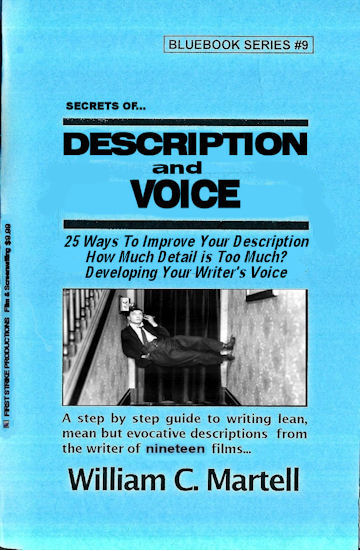 IS HALF OF YOUR STORY IN TROUBLE?
IS HALF OF YOUR STORY IN TROUBLE?
Most screenplays are about a 50/50 split between dialogue and description - which means your description is just as important as your dialogue. It just gets less press because the audience never sees it, the same reason why screenwriters get less press than movie stars. But your story will never get to the audience until readers and development executives read your script... so it is a very important factor. Until the movie is made the screenplay is the movie and must be just as exciting as the movie. So how do you make your screenplay exciting to read? Description is important in a novel as well, and the “audience” does read it... how do we write riveting description?
This Blue Book will dive into techniques to improve your description, with sections on Just Good Writing, How Much Detail Is Too Much, How & What You Should Write, and a section on Your Writer’s Voice.
SUBJECTS INCLUDE: What Is Good Description? 25 Professional Techniques To Improve Description, Hidden Camera Directions, Contrast, Why You Need To Be Vaguely Specific, Using “Gags”, Hitchcock’s Chocolates, Unusual Storytelling Devices, The “Unfilmable” Controversy, Too Many Or Too Few Details? Using Name Brands, “Bound” And Creating Vivid Imagery, Stunts (Like First Person Screenplays), The New Normal, What Is Voice? Developing Your Unique Voice, Voice & Tarantino’s “Inglorious Bastards”, and much more!
Take command of your description and your unique writer’s voice!
SPECIAL:
WEDNESDAY: 99 Cents. THURSDAY: $1.99. FRIDAY: $2.99. SATURDAY: $3.99.
CLICK HERE FOR MORE INFO!
UK Folks Click Here.
German Folks Click Here.
French Folks Click Here.
Espania Folks Click Here.
Canadian Folks Click Here.
India Folks Click Here.
Austrailian Folks Click Here.
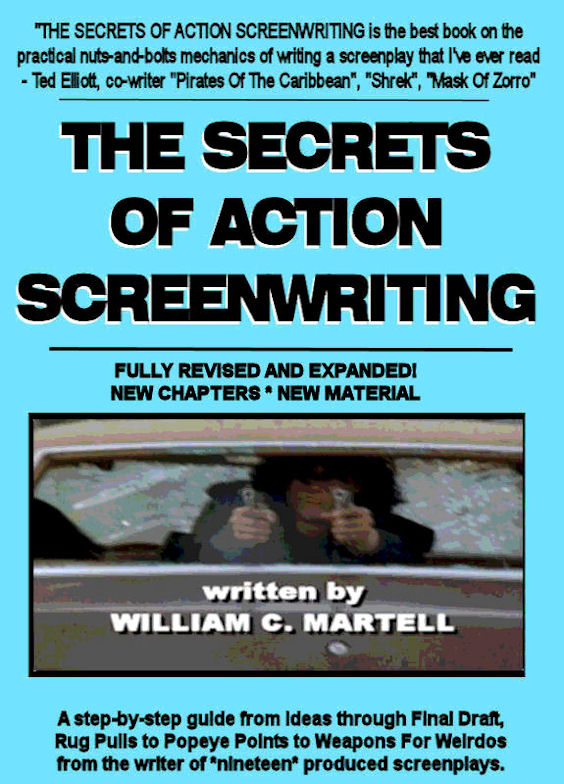
THE BOOK THAT STARTED IT ALL!
*** THE SECRETS OF ACTION SCREENWRITING *** - For Kindle!
*** THE SECRETS OF ACTION SCREENWRITING *** - For Nook!
Why pay $510 for a used version of the 240 page 2000 version that used to retail for $21.95? (check it out!) when
you can get the NEW EXPANDED VERSION - over 500 pages - for just $9.99? New chapters, New examples, New techniques!
"SECRETS OF ACTION SCREENWRITING is the
best book on the practical nuts-and-bolts mechanics of writing a screenplay I've ever read."
- Ted Elliott, co-writer of MASK OF ZORRO, SHREK, PIRATES OF THE CARIBBEAN and the sequels (with Terry Rossio). (ie; 4 of the top 20 Box Office Hits Of ALL TIME.)
Only $9.99 - and no postage!
"Bill Martell is one of Hollywood's best action-adventure writers, with 19 produced films to his credit. His "little blue books" on the art of screenplay writing are legendary," Best Selling novelist Dale Brown ("Strike Force", "Flight Of The Old Dog").
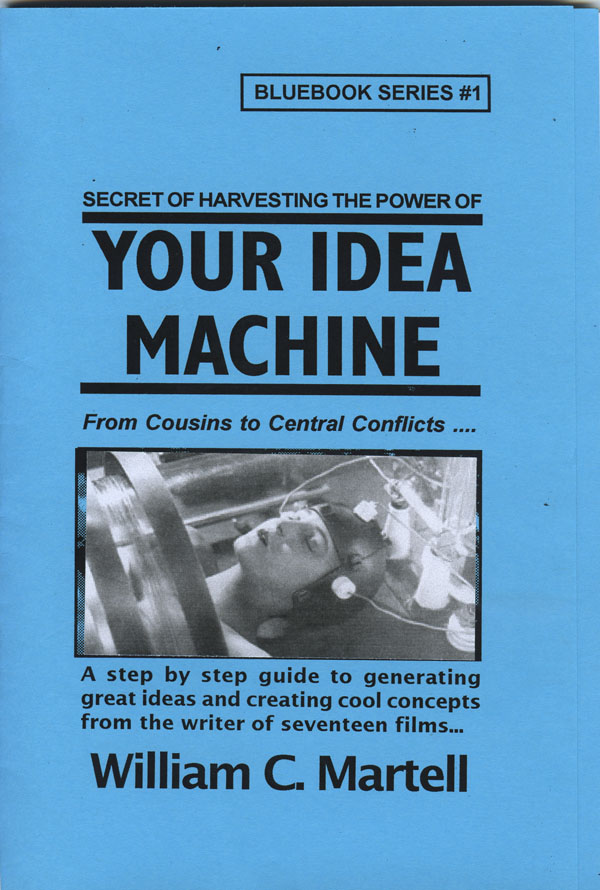
GOT IDEAS?
*** YOUR IDEA MACHINE *** - For Kindle!
*** YOUR IDEA MACHINE *** - For Nook!
Expanded version with more ways to find great ideas! Your screenplay is going to begin with an idea. There are good ideas and bad ideas and commercial ideas and personal ideas. But where do you find ideas in the first place? This handbook explores different methods for finding or generating ideas, and combining those ideas into concepts that sell. The Idea Bank, Fifteen Places To Find Ideas, Good Ideas And Bad Ideas, Ideas From Locations And Elements, Keeping Track Of Your Ideas, Idea Theft - What Can You Do? Weird Ways To Connect Ideas, Combing Ideas To Create Concepts, High Concepts - What Are They? Creating The Killer Concept, Substitution - Lion Tamers & Hitmen, Creating Blockbuster Concepts, Magnification And The Matrix, Conflict Within Concept, Concepts With Visual Conflict, Avoiding Episodic Concepts, much more! Print version is 48 pages, Kindle version is over 175 pages!
Only $4.99 - and no postage!
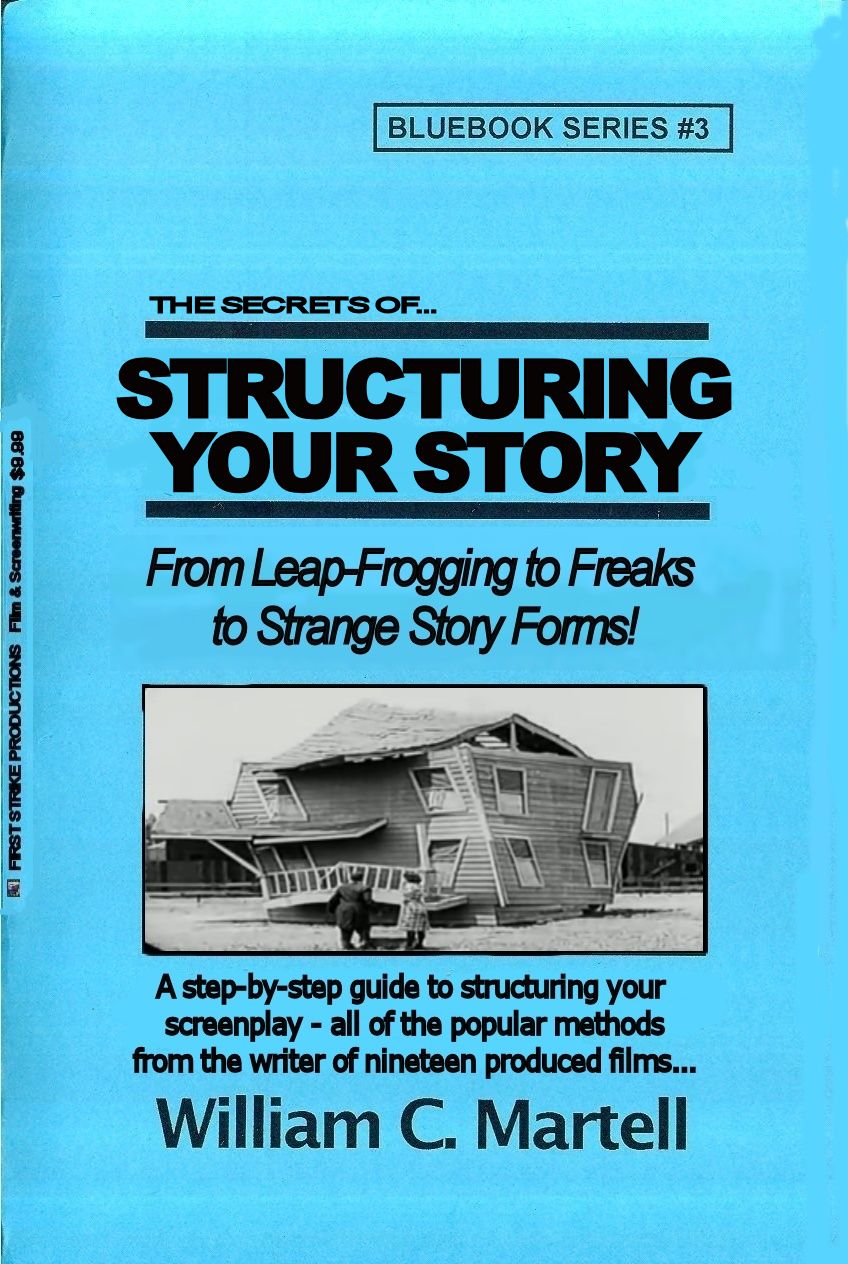
NEW AND HOT!
*** STRUCTURING YOUR STORY *** - For Kindle!
William Goldman says the most important single element of any screenplay is structure. It’s the skeleton under the flesh and blood of your story. Without it, you have a spineless, formless, mess... a slug! How do you make sure your structure is strong enough to support your story? How do you prevent your story from becoming a slug? This Blue Book explores different types of popular structures from the basic three act structure to more obscure methods like leap-frogging. We also look at structure as a verb as well as a noun, and techniques for structuring your story for maximum emotional impact. Most of the other books just look at *structure* and ignore the art of *structuring* your story. Techniques to make your story a page turner... instead of a slug!

STORY PROBLEMS?
*** STORY: WELL TOLD *** - For Kindle!
This book takes you step-by-step through the construction of a story... and how to tell a story well, why Story always starts with character... but ISN'T character, Breaking Your Story, Irony, Planting Information, Evolving Story, Leaving No Dramatic Stone Unturned, The Three Greek Unities, The Importance Of Stakes, The Thematic Method, and how to create personal stories with blockbuster potential. Ready to tell a story? Print version was 48 pages, Kindle version is over 85,000 words - 251 pages!
Only $4.99 - and no postage!

NEW!
*** HOOK 'EM IN TEN *** - For Kindle!
Your story doesn't get a second chance to make a great first impression, and this book shows you a bunch of techniques on how to do that. From the 12 Basic Ways To Begin Your Story, to the 3 Stars Of Your First Scene (at least one must be present) to World Building, Title Crawls, Backstory, Starting Late, Teasers and Pre Title Sequences, Establishing Theme & Motifs (using GODFATHER PART 2), Five Critical Elements, Setting Up The Rest Of The Story (with GODFATHER), and much more! With hundreds of examples ranging from Oscar winners to classic films like CASABLANCA to some of my produced films (because I know exactly why I wrote the scripts that way). Biggest Blue Book yet! Print version was 48 pages, Kindle version is over 100,000 words - 312 pages!
Only $4.99 - and no postage!
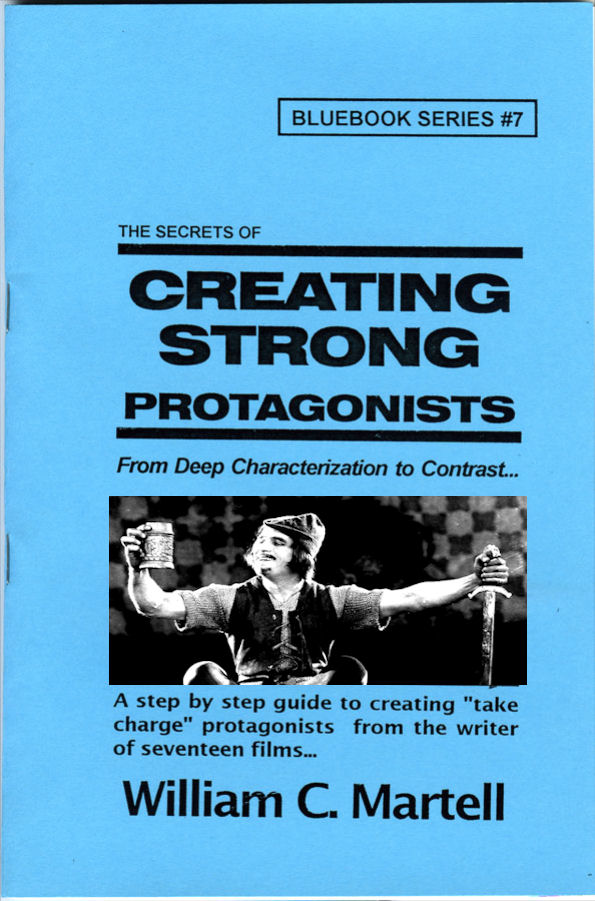
MOVIES ARE CHARACTERS!
*** CREATING STRONG PROTAGONISTS *** - For Kindle!
*** CREATING STRONG PROTAGONISTS *** - For Nook!
Expanded version with more ways to create interesting protagonists! A step-by-step guide to creating "take charge" protagonists. Screenplays are about characters in conflict... characters in emotional turmoil... Strong three dimensional protagonists who can find solutions to their problems in 110 pages. But how do you create characters like this? How do you turn words into flesh and blood? Character issues, Knowing Who Is The Boss, Tapping into YOUR fears, The Naked Character, Pulp Friction, Man With A Plan, Character Arcs, Avoiding Cliche People, Deep Characterization, Problem Protagonists, 12 Ways To Create Likable Protagonists (even if they are criminals), Active vs. Reactive, The Third Dimension In Character, Relationships, Ensemble Scripts, and much, much morePrint version is 48 pages, Kindle version is once again around 205 pages!
Only $4.99 - and no postage!
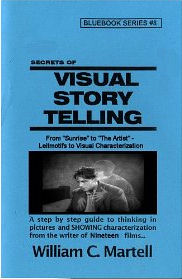
I WRITE PICTURES!
*** VISUAL STORYTELLING *** - For Kindle! (exclusive)
Show Don't Tell - but *how* do you do that? Here are techniques to tell stories visually! Using Oscar Winning Films and Oscar Nominated Films as our primary examples: from the first Best Picture Winner "Sunrise" (1927) to the Oscar Nominated "The Artist" (which takes place in 1927) with stops along the way Pixar's "Up" and Best Original Screenplay Winner "Breaking Away" (a small indie style drama - told visually) as well as "Witness" and other Oscar Winners as examples... plus RISE OF THE PLANET OF THE APES. Print version is 48 pages, Kindle version is over 200 pages!
Only $4.99 - and no postage!

DIALOGUE TO DIE FOR!
*** DIALOGUE SECRETS *** - For Kindle!
*** DIALOGUE SECRETS *** - For Nook!
Expanded version with more ways to create interesting protagonists! How to remove bad dialogue (and what *is* bad dialogue), First Hand Dialogue, Awful Exposition, Realism, 50 Professional Dialogue Techniques you can use *today*, Subtext, Subtitles, Humor, Sizzling Banter, *Anti-Dialogue*, Speeches, and more. Tools you can use to make your dialogue sizzle! Special sections that use dialogue examples from movies as diverse as "Bringing Up Baby", "Psycho", "Double Indemnity", "Notorious", the Oscar nominated "You Can Count On Me", "His Girl Friday", and many more! Print version is 48 pages, Kindle version is over 175 pages!
Only $4.99 - and no postage!
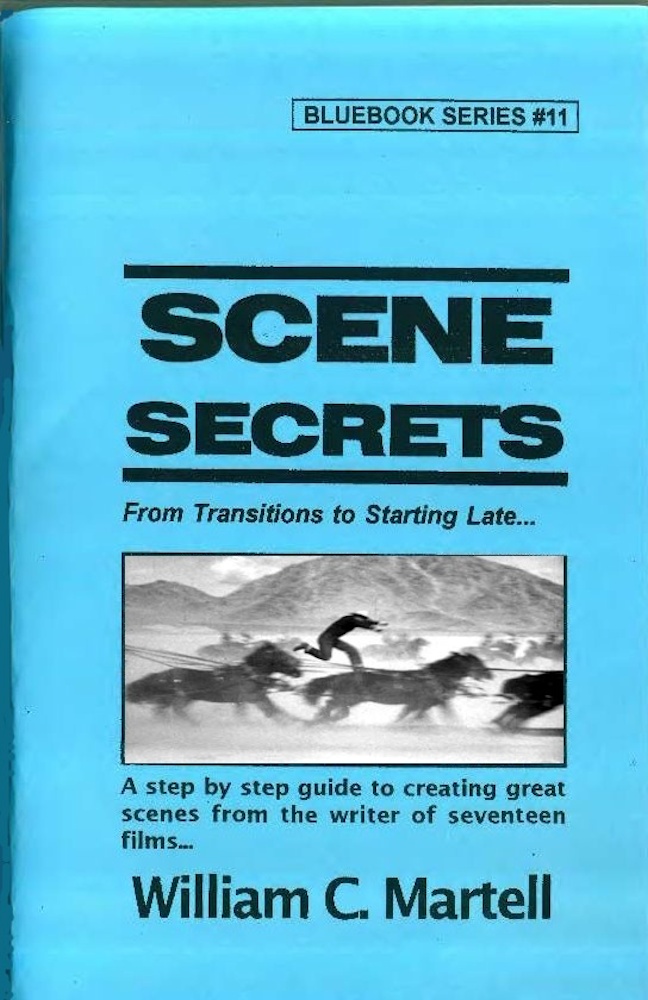
SECRETS OF SCENES!
*** SCENE SECRETS BLUE BOOK *** - For Kindle! (Exclusive)
What is a scene and how many you will need? The difference between scenes and sluglines. Put your scenes on trial for their lives! Using "Jaws" we'll look at beats within a scene. Scene DNA. Creating set pieces and high concept scenes. A famous director talks about creating memorable scenes. 12 ways to create new scenes. Creating unexpected scenes. Use dramatic tension to supercharge your scenes. Plants and payoffs in scenes. Plus transitions and buttons and the all important "flow"... and more! Over 65,000 words!
Print version was 48 pages, Kindle version is around 210 pages!
Only $4.99 - and no postage!
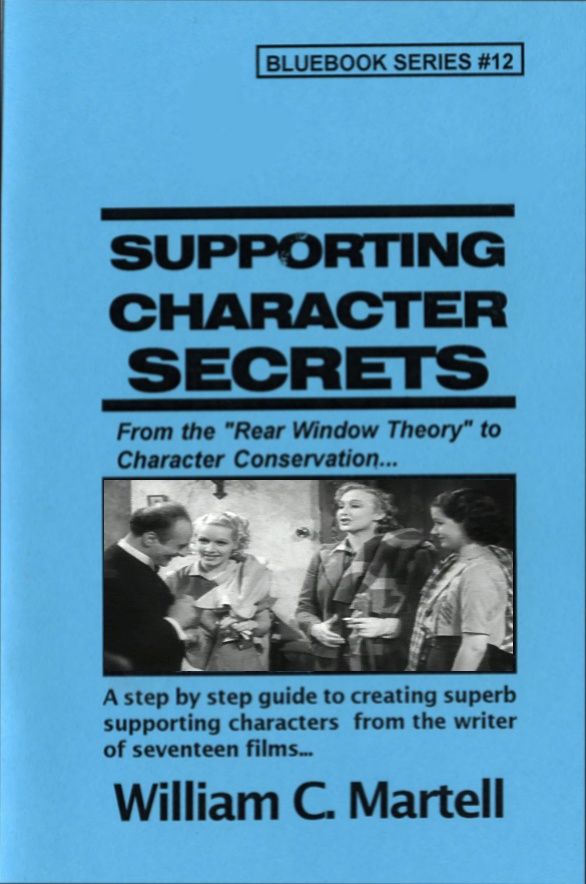
BEST SUPPORTING ACTORS?
*** SUPPORTING CHARACTER SECRETS *** - For Kindle! (Exclusive)
Expanded version with more techniques to flesh out your Supporting Characters and make them individuals. Using the hit movie BRIDESMAIDS as well as other comedies like THE HANGOVER and TED and HIGH FIDELITY and 40 YEAR OLD VIRGIN and many other examples we look at ways to make your Supporting Characters come alive on the page. Includes Story Purpose of characters and Subplots. Print version was 48 pages, Kindle version is around 150 pages!
Only $4.99 - and no postage!
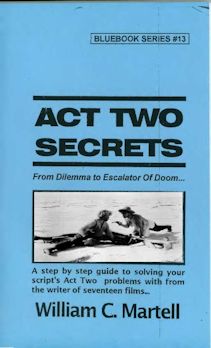
STUCK IN THE MIDDLE?
*** ACT TWO SECRETS *** - For Kindle!
Expanded version with more techniques to help you through the desert of Act Two! Subjects Include: What Is Act Two? Inside Moves, The 2 Ps: Purpose & Pacing, The 4Ds: Dilemma, Denial, Drama and Decision, Momentum, the Two Act Twos, Subplot Prisms, Deadlines, Drive, Levels Of Conflict, Escalation, When Act Two Begins and When Act Two Ends, Scene Order, Bite Sized Pieces, Common Act Two Issues, Plot Devices For Act Two, and dozens of others. Over 67,000 words (that’s well over 200 pages) of tools and techniques to get you through the desert of Act Two alive!
Print version was 48 pages, Kindle version is over 208 pages!
Only $4.99 - and no postage!
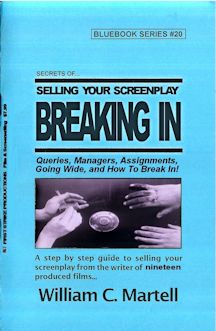
Only 402 Pages!
*** BREAKING IN BLUE BOOK *** - For Kindle!
Should really be called the BUSINESS BLUE BOOK because it covers almost everything you will need to know for your screenwriting career: from thinking like a producer and learning to speak their language, to query letters and finding a manager or agent, to making connections (at home and in Hollywood) and networking, to the different kinds of meetings you are will have at Studios, to the difference between a producer and a studio, to landing an assignment at that meeting and what is required of you when you are working under contract, to contracts and options and lawyers and... when to run from a deal! Information you can use *now* to move your career forward! It's all here in the Biggest Blue Book yet!
Print version was 48 pages, Kindle version is over 400 pages!
Only $4.99 - and no postage!
HITCHCOCK BOOKS
HITCHCOCK: MASTERING SUSPENSE
LEARN SUSPENSE FROM THE MASTER!Alfred Hitchcock, who directed 52 movies, was known as the “Master Of Suspense”; but what exactly is suspense and how can *we* master it? How does suspense work? How can *we* create “Hitchcockian” suspense scenes in our screenplays, novels, stories and films?
This book uses seventeen of Hitchcock’s films to show the difference between suspense and surprise, how to use “focus objects” to create suspense, the 20 iconic suspense scenes and situations, how plot twists work, using secrets for suspense, how to use Dread (the cousin of suspense) in horror stories, and dozens of other amazing storytelling lessons. From classics like “Strangers On A Train” and “The Birds” and “Vertigo” and “To Catch A Thief” to older films from the British period like “The 39 Steps” and “The Man Who Knew Too Much” to his hits from the silent era like “The Lodger” (about Jack The Ripper), we’ll look at all of the techniques to create suspense!
Films Included: NOTORIOUS, SABOTAGE, STRANGERS ON A TRAIN, THE 39 STEPS, REBECCA, TO CATCH A THIEF, FRENZY, FOREIGN CORRESPONDENT, THE LODGER, THE BIRDS, TORN CURTAIN, SABOTEUR, VERTIGO, THE MAN WHO KNEW TOO MUCH (1934), THE MAN WHO KNEW TOO MUCH (1955), SUSPICION, and NUMBER SEVENTEEN. 17 Great Films!
Only 125,000 words!
Price: $5.99
HITCHCOCK: EXPERIMENTS IN TERROR

HITCHCOCK DID IT FIRST!
We all know that Alfred Hitchcock was the Master Of Suspense, but did you know he was the most *experimental* filmmaker in history?
** HITCHCOCK: EXPERIMENTS IN TERROR **
Contained Thrillers like “Buried”? Serial Protagonists like “Place Beyond The Pines”? Multiple Connecting Stories like “Pulp Fiction”? Same Story Multiple Times like “Run, Lola, Run”? This book focuses on 18 of Hitchcock’s 52 films with wild cinema and story experiments which paved the way for modern films. Almost one hundred different experiments that you may think are recent cinema or story inventions... but some date back to Hitchcock’s *silent* films! We’ll examine these experiments and how they work. Great for film makers, screenwriters, film fans, producers and directors.
Films Examined: “Rear Window”, “Psycho”, “Family Plot”, “Topaz”, “Rope”, “The Wrong Man”, “Easy Virtue”, “Lifeboat”, “Bon Voyage”, “Aventure Malgache”, “Elstree Calling”, “Dial M for Murder”, “Stage Fright”, “Champagne”, “Spellbound”, “I Confess”, and “The Trouble with Harry”, with glances at “Vertigo” and several others. Over 77,000 words!
Only $5.99 - and no postage!
STORY IN ACTION BOOKS
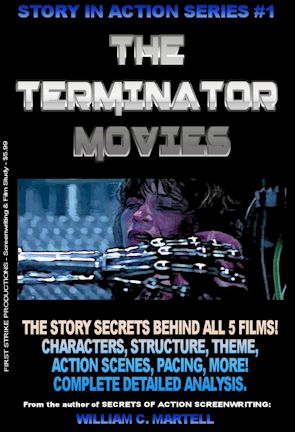
Over 240 pages!
*** THE TERMINATOR MOVIES *** - For Kindle!
He's back! The release of "Terminator: Genisys" (now on BluRay) is set to begin a new trilogy in the Terminator story... 31 years after the first film was released. What draws us to these films about a cybernetic organism from the future sent back in time? Why is there a new proposed trilogy every few years? This book looks at all five Terminator movies from a story standpoint - what makes them work (or not)? What are the techniques used to keep the characters and scenes exciting and involving? How about those secret story details you may not have noticed? Containing a detailed analysis of each of the five films so far, this book delves into the way these stories work... as well as a complete list of box office and critical statistics for each film. This book is great for writers, directors, and just fans of the series.
Only $3.99!

BRAND NEW!
All five "Bourne" movies (including "Legacy" and it's potential sequels) - what are the techniques used to keep the characters and scenes exciting and involving? Reinventing the thriller genre... or following the "formula"? Five films - each with an interesting experiment! A detailed analysis of each of the films, the way these thrillers work... as well as a complete list of box office and critical statistics for each film. This book is great for writers, directors, and just fans of the series.
PRICE: $3.99 - and no postage!
UK Folks Click Here.
German Folks Click Here.
French Folks Click Here.
Espania Folks Click Here.
Canadian Folks Click Here.
VINTAGE SCREENWRITING BOOKS

ADVICE FROM #2 SCREENWRITER!
*** VINTAGE #1: HOW TO WRITE PHOTOPLAYS *** - For Kindle!
***
Screenwriting books have been around as long as films have. This series reprints vintage screenwriting books with a new introduction and history, plus new articles which look at how these lessons from almost 100 years ago apply to today’s screenplays. Anita Loos book is filled with information which still applies. In addition to the full text of the original book, you get the full screenplay to Miss Loos' hit THE LOVE EXPERT, plus several new articles on the time period and women in Hollywood.
Only $2.99!
"SECRETS OF ACTION SCREENWRITING is the best book on the practical nuts-and-bolts mechanics of writing a screenplay I've ever read." - Ted Elliott, co-writer "The Mask Of Zorro", "Shrek" and "Pirates Of The Caribbean".
"William C. Martell knows the action genre inside out. Read and learn from an expert!" - Mark Verheiden, screenwriter, "Time Cop" and "The Mask", head writer on "Smallville" and "Constantine".
"This book is dangerous. I feel threatened by it." -Roger Avary, Oscar winning screenwriter, "Pulp Fiction" and "Killing Zoe".
"Bill Martell is one of Hollywood's best action-adventure writers, with 19 produced films to his credit. His "Blue Books" on the art of screenplay writing are legendary and "Secrets of Action Screenwriting" is the best." - Best selling novelist Dale Brown.
"My only complaint with SECRETS OF ACTION SCREENWRITING is that it wasn't around when I was starting out. The damned thing would have saved me years of trial and error!" - Ken Wheat, screenwriter, "Pitch Black" and "The Fly 2".
"There's an art to writing for guys like Chuck Norris -- thanks to Bill Martell's book, I was prepared." - Genia Shipman, screenwriter, "Walker: Sons of Thunder".
"Finally a screenwriting book written by a working professional screenwriter. Bill Martell really knows his stuff, showing you how to write a tight, fast screenplay." - John Hill, screenwriter, "Quigley Down Under" and "Closed Encounters Of The 3rd Kind".
These links all lead to the USA store, if you are in some other country and want to write a review for your country, go to your Amazon website.
Thank you all again.
Bill
